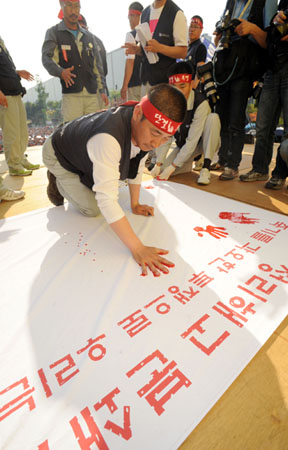Flexibility Or Stability
That Is the Question
By Bak Han-byeol, Tribune Reporter

On August 6th, Ssangyong Motor management and union leaders reached an agreement over dismissal plans. During the 77-day strike, Korean media reported various opinions of the union’s strike and pointed out the company’s mismanagement, the Korean police’s strict suppression, and the union’s selfish sit-in. However, they focused on the excessive repression by the police and the striking workers’ selfishness. Let’s examine how several foreign news organizations and a labor journal reported on this incident.
BBC News, a department of the British Broadcasting Corporation, reported the conflict between Ssangyong Motor management and union, under the title, “Who Won Epic South Korean FactoryBattle?” It mentioned the poor welfare of workers as the critical reason for the union’s strike, but focused on its excessively selfish strike based on an unrealistic understanding of the current situation of the company. It also pointed out that Korean labor groups have a tendency to make their appeals by employing excessive physical strength to solve problems. Therefore, BBC News concluded that the union needed to correctly and reasonably understand the company’s urgent situation.
The New York Times, an American daily newspaper, took an objective look at the incident of Ssangyong Motor, but remarked that the police’s suppression was violent. It also supported the union, focusing on the workers’ hardships and powerlessness to resist the police. It quoted the union worker’s claim that if the police and company intensified their suppression them, they would continue their strike. It suggested that the police’s strong suppression should be brought to an end because it forced the union to go to extremes and use drastic measures in self-defense.
Labor Notes, an American monthly magazine for labor activists, denounced the severe suppression of Korean police, reported news and analysis about the current problems facing the labor movement and gave voice to the workers. It also explained that in a global age, multinational or foreign international corporations own companies all over the world, but the unions of domestic companies often do not like foreign management. This could make union workers protests turn violent against foreign company management. In addition, the magazine focused on Ssangyong Motor workers’ difficult situation and the need for the police’s non-violent intervention lest workers’ human rights should be threatened.
Al Jazeera, a satellite television network headquartered in Qatar, focused on the union workers’ struggle to resist police and company repression by using dangerous weapons and pointed out that their human rights were threatened. Quoting some workers’ statements, it insisted that the reason for the strike was the company’s bad management and Korean police’s excessive suppression. It also concluded that the company should present a better proposal regarding layoffs.
As described above, the foreign press interpreted the strike in various ways. Many foreign news agencies believed the company was the source of the strike. To survive, companies and unions have to act together. Otherwise, it will lead to more conflict. Therefore both sides should appreciate one another and be ready to make concessions. Unions have to understand the companies’ situation. Without companies, their members cannot work. Companies have to find ways to provide a fair deal for their workers. They must make reasonable plans for the future. Perhaps everyone, union workers and managers, should step back and consider what the shoe is like on the other foot. A little “yeokjisaji” would be of benefit to everyone.

